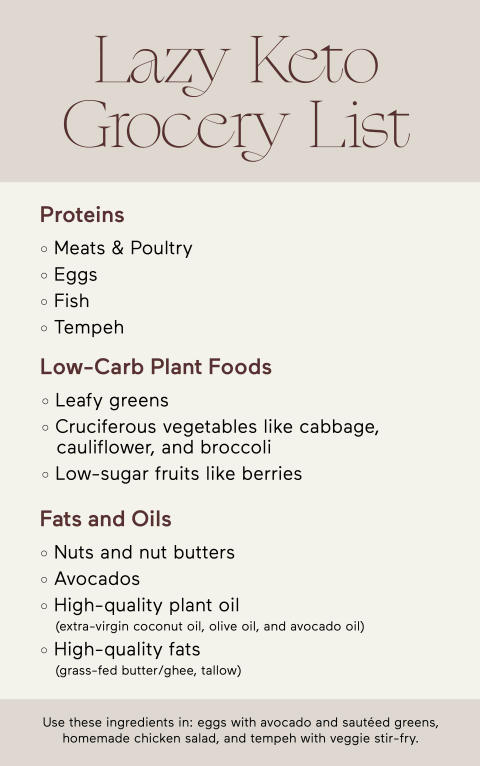Advertisement
Lazy Keto Diet 101: How To Do It + A Sample Grocery List & Meal Plan


By now, we've probably all heard of the keto diet—a diet very low in carbohydrates, high in fat, and moderate in protein that puts the body into a state of ketosis. In ketosis, the body uses broken-down fat (or ketones) for energy instead of glucose from carbs.
A ketogenic diet can be an effective way for some to lose weight and improve health1. (Here's a deep dive into the diet and its benefits.)
However, many people find the process of tracking their food for the keto diet too challenging and difficult to maintain over a long period of time. The "lazy keto" diet is a variation of the traditional ketogenic diet that has become popular because it is less restrictive but may still offer some (but not all) of the benefits.
Here's what to know about lazy keto's benefits, limitations, recommended foods, and a sample meal plan.
What is the lazy keto diet?
Lazy keto is a more comfortable approach to reaching nutritional ketosis that does not require counting calories or tedious macronutrient tracking.
It does, however, require you to track carbohydrates since carbohydrate restriction is the most important component for achieving ketosis.
"Lazy keto is simply eating less than 50 grams of carbs per day (total, not net), which most experts agree produces a mild state of ketosis, glycemic control, and weight loss for the majority of people," says Dominic D'Agostino, Ph.D., a metabolic health researcher and keto diet expert. "Generally speaking, it produces results without the efforts of having to count macros (aside from carbs) or total calories."
For some context, you'll get 50 grams of carbs by eating four slices of whole-grain bread a day.
Summary
Lazy keto vs keto
The traditional ketogenic diet, initially introduced as a dietary strategy to control epileptic seizures2, by definition requires one to tightly control carbohydrate, fat, and protein intakes.
"A 4:1 clinical ketogenic would be 'strict keto,'" says D'Agostino. This ratio calls for 4 parts fats to 1 part carbs and protein combined, or roughly:
- 90% of calories coming from fats
- 6% from protein
- 4% carbs
Many people who try to follow a ketogenic diet cannot adhere to this. The lazy keto diet offers an easier-to-follow alternative that may be suitable for those hoping to achieve some keto benefits for diet nonmedical purposes.
It's one of many variations of the keto diet that are now popular, including the Mediterranean keto diet, the vegetarian keto diet, the vegan keto diet, and the high-protein keto diet.
Criticisms and cautions about the lazy keto diet
Food choices also still matter on a lazy keto diet, as health scientist Milene Brownlow, Ph.D., explains. "Many people will be tempted to try shortcuts by adopting a 'lazy keto' approach, such as ordering fast food but skipping the bun, loading up on extra cheese and bacon."
While this approach will reduce your carb intake and might lead to increased ketosis and weight loss, that doesn't necessarily mean it's healthy. "You may be cheating yourself of important nutrients (such as vitamins, minerals, and fibers) that play crucial roles in metabolic, neurological, and hormonal balance," says Brownlow.
She also emphasizes that "There's extensive clinical and scientific support for the benefits of ketogenic approaches in patient populations with neurological and metabolic disorders. If you're considering a ketogenic diet for this reason, keep in mind that food is much more than mere fuel for our cells; it provides important information for all biochemical reactions in living organisms. In order to optimize your ketogenic approach, you should consider a well-formulated ketogenic diet that includes key micronutrients, vitamins, minerals, and fiber."
Moral of the story: Lazy keto is not about getting lazy with what you eat.
If you find yourself opting for fast-food burger patties in fear of over-consuming carbohydrates from fibrous vegetables and plant foods, that's a red flag. It's important not to sacrifice overall diet quality for the sake of hitting your carbohydrate targets.
It's also worth noting that a lazy keto approach may end up just being a very low carbohydrate diet, which isn't always a ketogenic diet. Technically, you are following a keto diet if you are in ketosis. This means that your liver got the cue that glucose and insulin levels are low, and fat metabolism is revved up to the point that ketones are now being produced.
Summary
Benefits of the lazy keto diet
The draw to a lazy keto diet is that you can potentially reach the following goals without being all-consumed by the macro breakdown of each meal you eat:
Weight loss (by way of reducing processed foods).
You can improve your health by limiting carbohydrate intake without necessarily getting into ketosis or following a strict ketogenic diet.
Many carbohydrates consumed in the typical Western diet are found in ultra-processed foods, which can lead to weight gain. So, any diet that significantly reduces simple carbohydrates from ultra-processed foods (like lazy keto) may support weight loss and other health outcomes.
If the lazy keto is done right, it can improve overall diet quality and also serve as a low-carbohydrate whole-foods diet.
Blood sugar management.
Moreover, by cutting out processed carbohydrates and sugars, you may curb drastic fluctuations in blood sugar levels that can negatively affect mood, appetite, and attention.
The fact of the matter is that the vast majority of American adults are metabolically unhealthy, even those that are considered normal weight3. A lazy keto diet can be a less complicated way to get blood sugar levels under control and improve and/or prevent insulin resistance.
Potential cognitive, anti-inflammatory, and energy benefits.
Research shows, for example, that ketones have neuroprotective properties5 such as enhanced brain energy metabolism and reduced neuroinflammation.
Summary
Who should avoid lazy keto?
A lazy keto diet is more about promoting reduced carbohydrate intake and increasing diet quality for the sake of overall health and wellness, not necessarily specific medical conditions.
If you are following a ketogenic diet for health or medical-related purposes that require you to sustain ketosis, then a lazy keto approach likely doesn't provide the structure you need. Make sure to always talk with your health care provider about how to best follow a keto diet if you're implementing it for medical reasons.
Just like the keto diet, the lazy keto diet may not be right for pregnant or breastfeeding women.
If you do notice unwanted side effects from following a ketogenic diet—lazy keto included—then you should consider making changes to your diet. It may not be the restricted carbs that are the issue but that you are under-consuming protein or calories.
Everyone is unique and should consult a health professional when trying to optimize their nutrition.
Summary
Lazy keto staples
In our modern world where sugars are hidden in almost all packaged foods, drinks, and condiments, monitoring your carbohydrate intake takes work.
In this way, a lazy keto diet really only ends up being "lazy" when you are eating mostly whole foods (aka the foods that don't have an ingredient list because they are the ingredient).
Here are some whole-food, low-carb staples for a lazy keto diet:

Expert's choice: Medium-Chain Triglycerides (MCTs)
Sample lazy keto meal plan
Breakfast options:
- Eggs with avocado and sauteed greens
- No-fruit protein smoothie (toss some greens, blueberries, steamed then frozen cauliflower, and avocado in there to bulk it up)
Lunch options:
- Cobb salad with greens, tomatoes, hard-boiled eggs, bacon, and no sugar in the dressing
- Homemade chicken salad (made with avocado oil mayo) lettuce wraps
Dinner options:
- Roasted chicken thighs with cauliflower rice
- Meatballs with tomato sauce over zucchini noodles
- Tempeh and veggie stir-fry
Snacks: Here is a list of keto-friendly low-carb snacks.
FAQ
Can you still lose weight on lazy keto?
Yes. The lazy keto diet typically promotes weight loss by encouraging you to eat a low-carbohydrate whole-foods diet and limit your processed foods.
How is lazy keto different from keto?
Unlike the traditional keto diet—which actively monitors protein, fat, and carbs—the lazy keto diet only cares about carb intake.
The takeaway
A ketogenic diet does require thought, consideration, and in many instances tracking for all macronutrients. What is "lazy" about the lazy keto diet is not necessarily the food you eat but the tracking component. All you need to worry about when following a lazy keto diet is reducing carbs to ~50 grams per day. Reducing carbs to this level will likely put you into a state of ketosis.
Hitting this target is a lot easier and will offer the most benefits when mostly composed of whole, minimally processed foods. This grocery list and meal plan can help you stay nourished and satiated while still cutting carbs. And if cooking isn't your thing, check out these keto-approved meal delivery kits.
